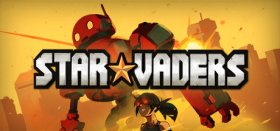
StarVaders Review
StarVaders is a fantastic game, combining roguelikes with tactical RPGs to create an incredible final product. I’m not the biggest fan of this genre, but StarVaders has managed to not only change my mind but also make me desperately hope for more of its kind. There’s an insane amount of variety here, and combined with its beautiful art style, multiple difficulties, and challenges, it makes for a brilliant game.
The story is incredibly simple but has some small quirks which make it far more interesting. The Earth is under attack by Aliens, and it’s up to you as a Mech Pilot to take the fight to them and save the world. That’s pretty much it as far as the actual story goes, but the Pilots themselves have massive amounts of style and charm. While they all have interesting visual designs, thanks to the game's stellar artwork, each of them has unique quirks, both in story and in gameplay, which I’ll tackle later. Upon completing a run, you’ll get a small snippet of conversation between the Pilot you were playing as and other characters, helping to deepen their personalities. It’s not necessary, but I’m really glad they’re here. In a lot of other titles, I’ll choose exclusively because of their kit and playstyle, without giving much thought about their personalities, but here I’m finding myself more invested in the characters themselves.

The gameplay itself takes place on a series of small-scale grids, where you use your Mech’s cards to move and attack the enemies, clear the area, and move on to the next. Each of the three Mechs has its unique energy system and cards to work with them, while the Pilots — three for each Mech — have unique variations to these kits. The variety here is staggering, with them having a very definite initial playstyle, but being able to diversify an incredible amount thanks to the Cards and Artifacts you can obtain through your runs. The former are your main actions, and typically cost energy, while the latter have unique passive effects. It’s not breaking new ground as far as deck-building goes, but it’s done unbelievably well here.
What stands out to me is the sheer lack of numbers. Unlike a lot of other deckbuilders, you aren’t forced to sit and do long and occasionally tedious math to figure out if you’ll do the damage you need. Instead, your actions are visualised incredibly well on the grid when you select each card, but before it’s played. It’s super easy to pick up and play, and even more complex synergies between Cards and Artifacts are easy to comprehend.

The Mechs could be described as a class, while the Pilot is more of a subclass. The core playstyle and energy type are defined by the Mech, while the pilot has a unique set of cards to start with, along with unique Artifacts, too. This isn’t the end of the options for build-crafting, though. Like most deckbuilders, you’ll gather more cards as you progress through each run from completing encounters and from purchasing them in the shop before the boss of the Act (where you can also buy Artifacts). Certain encounters will have additional debuffs but give you a greater reward, and others will give you a permanent version of said debuff for even greater riches. There’s a nice risk/reward system at play, and it makes success feel earned.
Each run is broken up into a series of three main Acts, and a fourth for the game's true ending, and these have a series of encounters. Before every encounter, you’re given a choice between a few different options, having a variety of enemies and rewards. These can then be re-rolled with Chrono Tokens, which can also be used practically everywhere; from rerolling shops and rewards to restarting your turn, for a better hand, or to try to aim for a better outcome. The end of every Act has a boss, and you’ll encounter a variety of them that vary in difficulty. This can prove to be quite tedious, as some bosses often feel like a direct counter to certain builds, but it was rarely a huge problem, and emphasised the need for more versatility in builds.

I was a little let down by the Act 4 boss, though: I won’t go into too much detail to avoid spoilers, but it felt like it required a very specific type of build to defeat, and it was far more mechanically specific compared to many of the others. I understand the need for additional difficulty here, but it didn’t land quite as well for me as a lot of the other bosses did.
On top of normal runs, you have the difficult Challenges, which have a variety of modifiers to make the runs more challenging, or even just different. It adds a nice amount of direction for those looking for a deeper challenge beyond the core.
As a whole, StarVaders is one of the best deckbuilders I’ve played in quite some time, and might even manage to rival the greats. Its variety is impressive, its art direction is incredibly strong, and it’s generally just incredibly fun to play. There’s a perfect middle ground between pick up and play and more deep and intertwined systems that will appeal to both the hardcore tactical RPG fans and those new to the genre.
StarVaders (Reviewed on Windows)
Excellent. Look out for this one.
A near-flawless title, with an utterly fantastic gameplay loop, art direction and variety.








COMMENTS